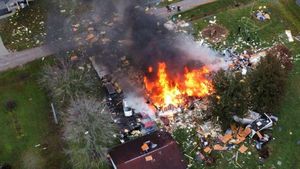Russia has taken a worrying step by launching an intercontinental ballistic missile (ICBM) targeted at Ukraine, marking the first use of such an advanced missile since its invasion began. This development emerged during early morning hours on Thursday, with the missile's origin traced back to the Astrakhan region, which is situated in southern Russia. According to reports from Ukraine's air force, the exact target of the missile has not yet been confirmed, raising concerns about the ramifications of this act on the already strained relationship between the two nations.
This missile strike from Russia follows recent events where Ukrainian forces, equipped with US and British missiles, successfully carried out strikes on Russian territory. Notably, these actions had received approval from Washington and London, hinting at the uptick of military strategy from Ukraine. With this backdrop, Ukrainian officials have rallied to urge calm within their borders. President Volodymyr Zelenskyy has communicated with citizens, emphasizing the need to avoid panic as the situation escalates.
The timing of this missile launch is particularly poignant, coming just after Ukraine began utilizing advanced missile systems against Russia, including British-made Storm Shadow missiles. The Ukrainian military confirmed its use of these long-range weapons following explicit permissions from allied nations, indicating heightened tensions and potentially shifting military dynamics.
President Zelenskyy's appeal for composure among Ukrainians reflects sharp anxieties stemming from the fear of increased Russian aggression. He cautioned against spreading panic during his evening address, stressing the potential for misinformation to fuel the situation. “The information frenzy today, with panicked messages, only benefits Russia,” he stated, urging citizens to support their military and remain alert to manipulations of fear.
The backdrop of missile retaliation and missile usage points to the grim and progressing involvement of numerous international players. For months, Moscow has issued stern warnings, highlighting it would interpret strikes against its territory as serious escalations—an ominous signal as the conflict drags on. Meanwhile, both sides are on high alert, underlining the precarious balance of power and the potential for significant conflicts.
Russian officials have maintained silence on specific details around this missile strike, which many view as a significant escalation. Kremlin spokesperson Dmitry Peskov redirected inquiries about the missile attack to the Russian Defense Ministry, fostering speculation around Moscow's next move and its perception of this new phase of warfare.
Intercontinental ballistic missiles like the one used can strike targets at unprecedented ranges, often many thousands of kilometers away. This development raises the stakes significantly, not just for Ukraine but for the broader geopolitics involving NATO and its eastern European allies. Western nations are intently watching for reactions, particularly against the backdrop of fears surrounding nuclear capabilities and potential retaliatory strikes.
Meanwhile, the dynamic within Europe remains tense, with increased military drills and preparations being undertaken by NATO forces. Observers note the stark reactionary posture, described by some analysts as strategic positioning against the threat posed by Russia. This includes joint exercises among NATO allies, which aim to send strong deterrence signals to Moscow, bolstering defense readiness at the borders.
Events leading up to the missile strike included heightened international activity as the US and UK reinforced Ukraine’s arsenal. The past week has seen the announcement of substantial military assistance, including advanced drones and missile systems, highlighting the resolve of the West to support Ukraine against its aggressor.
Concerns had simmered for days following intelligence updates about potential Russian responses to Ukrainian offensives. The US Department of Defense had drawn parallels to previous Russian retaliatory strategies, recalling incidents where Moscow struck back harshly after being challenged on the battlefield. With all this at play, the atmosphere felt charged and fraught with possibilities for escalation.
Zelenskyy’s statement after the ICBM launch reflects not just the mood among citizens but also the determinant nature of current events on strategic military planning. His calls for calm followed soon after he reassured heads of state and the Ukrainian populace about the government’s active measures to bolster their defense systems amid climbing tensions around the conflict.
Simultaneously, the international community continues to raise alarms over military maneuvers, with calls for de-escalation filling the diplomatic airways from various corners. Enhanced sanctions have been discussed, and many countries are preparing contingency plans should the situation deteriorate even more. These preemptive measures underline how dire the situation has become, as western officials look to thwart future escalatory measures by Russia.
Experts suggest the use of advanced missile technology, such as the ICBM fired from Astrakhan, could signal the strategic recalibrations happening within Moscow. Observers have pointed out this might be indicative of Russia’s attempt to project strength internationally, particularly as it grapples with domestic economic issues and international condemnation.
Meanwhile, as tensions rise, the ground realities on Ukraine's borders remain unstable, with both nations prepared for what could be longer-term confrontations. Civilian safety has become increasingly precarious not only due to current military actions but also from the potential for greater conflict extending beyond localized skirmishes. Concerns about civilian casualties and displacement emerge as discussions about military strategies continue to evolve.
The ensuing exchanges are where diplomacy, military strategy, and humanitarian concerns converge, amplifying the stakes for both sides. How the international community responds will play a pivotal role, not just for the immediate future of Ukraine and its allies but for the regional stability of the entire European continent.
Additional military support from partners remains one avenue being pursued vigorously by Kyiv, as it seeks to offset the advantages Moscow may hold with its expansive military capabilities. The future moves of both sides appear unpredictable, with the specter of larger scale conflict looming with every passing missile.
For now, the message reverberates among Ukrainians: be vigilant, stay informed, and support the national defense efforts as tensions reach new heights. The hopes of many around the world lie with Ukraine, as they navigate this turbulent, uncertain chapter against the backdrop of aggression and international posturing.



